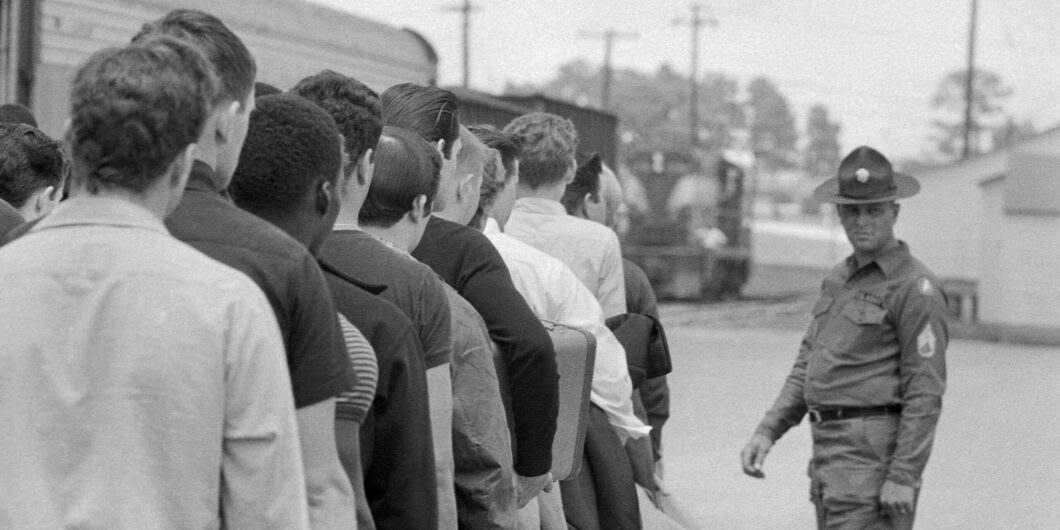Decapitation for a Headache
Steele Brand’s essay, “Rebuilding a Republican Army,” recalls for us a time long ago when we were also involved in debates over the draft. In those days, the draft existed and we were actually in a war. Despite the compelling context, the draft was wrong back then, and we would argue that it makes no sense today.
Let’s assume that Brand’s depiction of the condition of our military (and social and political culture) is, for the most part, accurate. If so, then the current situation is bad, and something needs to be done. However, the solution Brand offers for correcting the situation—that is, reinstituting conscription—seems analogous to offering decapitation for a headache! First, such a program is morally wrong and inconsistent with a free society, and second, it is unnecessary.
We would argue—and we think that Brand even suggests this—that the current bad condition of our military is due to actions of the state—the very institution Brand wants to use to solve the problem. But if this is so, then presumably change is possible, either through different state actions or through private means, or some combination. That is, the damaging policies adopted over the recent years can be stopped, education can be changed, compensation and various benefits for military service can be increased, foreign policy can be made coherent and liberty-oriented, and the importance of moral responsibility can be championed. There are alternatives to conscription.
Brand seems to recognize that there are these alternatives, but he nevertheless states: “Even if the political will could be mustered to address these problems, America’s recruiting crisis would remain. The simple fact is that Americans have been habituated to serve their own interests at the expense of the neighbor next door and their country. We have a culture that trains a selfishness inimical to our republic.”
Interestingly, this statement puts moral and cultural issues at the center of the argument. In this, we would concur. His statement also echoes a most common current moral confusion, namely that holding that the life of each and every human being is their ultimate value and end is simply selfishness. Treating people as “ends in themselves,” as conscription does not do, is not selfishness but moral respect. The view that without conscription we have selfishness is a non sequitur. Human self-perfection requires self-direction, without which there can be no moral responsibility.
Let’s reflect on these last claims for a moment. First, we live in a world where responsibility is seldom referred to. Instead, we are increasingly reduced to causal patterns that leave little room for personal responsibility. In everything from birth order and toilet training to our sociological conditions, we are excused from responsibility for our actions. We are regarded as being pushed and pulled by various forces that define those actions. Conscription is a quintessential removal from responsibility—you literally have no choice, and once in, you do as you’re told. Virtue by contrast involves owning your actions, being shall we say, the prime mover of them. That is what responsibility means, and we would argue that it is central to, indeed a necessary condition of, virtue. If Americans have become “habituated to serve their own interests,” it is because, as the state gobbles up more and more of the important responsibilities we once had—from providing for our old age, our health, and our financial security—there is little left to our self-direction than our petty interests.
Responsibility in this sense is not atomism. It is not the case that virtue and responsibility require actions disassociated from others. It is how these others combine that matters. Alexis de Tocqueville makes much of the American penchant for “intermediary institutions.” These were groups that came to exist between individuals and the state largely devoted to helping communities with a number of social functions. For example, some forms of welfare were often provided by these institutions as were other forms of assistance. Moreover, civic actions were often organized by these intermediary social forms. It is easy enough to imagine more of an effort to involve the community in its military through patriotic events and encouragement using such intermediary social forms. “Thank you for your service” hardly qualifies and strikes many in the service as a sign of the very self-interest Brand complains of—as if this is sufficient involvement in support of the military.
By erroneously supposing that physical compulsion and coercion can be the instrument for attaining virtue, Brand undercuts the opportunities for the development of not only virtue generally but patriotism particularly.
But two objections come to mind. The first is the claim that it does not matter what the motive is or the degree of responsibility so long as the good is done. Yet while Stalin may be comfortable breaking a few eggs to make his omelet, such an approach is quite contrary to a free society. Freedom must apply to all, and not to some, when it comes to claiming a society is free. Even if conscription “worked” it would amount to the breaking of eggs. And the degree to which one is willing to mix the initiatory use or threat of physical force with freedom is the degree to which one is distanced from a free society. The use or threat of physical force should be a response to limited and defined actions, not initiated.
The second counterargument would go something like this: To have virtue, people need to habituate themselves to it. Conscription is a way to do that for the virtue of courage needed for defense of one’s community. Yet contrary to what many alleged conservatives continue to think, virtue is not simply the result of habituation. It also requires both understanding and choice, which are themselves expressions of human agency. Regardless of its particular form, virtue cannot be virtue without this agency—that is, without self-direction. Without self-direction, what habituation would produce is conformity, not virtue. Unthinking and involuntary following of a rule or norm may be a form of training, but it is not virtue. The best way to produce virtue then is to increase responsibility, and politically that means a political and legal order that protects liberty as defined by the basic negative natural rights of individuals to their life, liberty, and property. Such liberty allows for the possibility of self-direction and moral responsibility and hence virtue. Simply put, if we are to have the virtue that Brand desires, self-direction requires protection, not its abrogation. Moreover, to have a culture that allows for the pursuit of human excellence and an appreciation of patriotism requires reaffirming that the purpose of government is the protection of individual rights and the celebration of a culture that supports these rights. We want a military of free persons who find the military life rewarding and free citizenry that will support them in the just cause of mutual self-defense and protection.
Conscription is, then, not only decapitation for a headache in the sense of being an unnecessary and extreme proposal, but it also is contrary to the self-direction that is necessary for the development of a culture that holds liberty as the paramount value for the political/legal order. By erroneously supposing that physical compulsion and coercion can be the instruments for attaining virtue, Brand undercuts the opportunities for the development of not only virtue generally but patriotism particularly. Conscription is not the cure to selfishness, but a form of it, since the self-direction of some is sacrificed to the ends of others. Let’s respect the rights of others and encourage doing more than just thanking them for their service. Let’s look for ways in which we can all support the military voluntarily.



